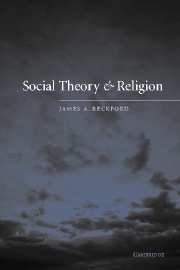2 - Secularisation
Published online by Cambridge University Press: 18 December 2009
Summary
Introduction
If theories are defined in rigorous terms, then social theories are rare; and social theories of religion are even rarer. But what are ‘theories’? A widely accepted, if dated, view is that theories are sets of assumptions, initial conditions and logically interrelated propositions from which testable hypotheses can be derived. This is an admittedly extreme example of how to define theories. It is fairly representative, however, of ideas that dominated the philosophy of science and, by extension, the philosophy of social science in the mid-twentieth century. It was fashionable then to assume that the intellectual power of the ‘hard’ sciences such as physics and chemistry depended on the continuous process of formulating, testing and reformulating theories (the hypothetico-deductive method) in the desire to make their generalisations applicable to more and more phenomena. Leaving aside all variations in the understanding of these so- called propositional theories (but see Zetterberg 1965), the opinions of philosophers and historians of science have subsequently become much more divided about the status and character of theory in scientific work.
Although the popularity of rigorous propositional theories was never strong among philosophers of social science, there is a lingering respect, if not nostalgia in some places, for at least the ideal of being able to state important generalisations about social phenomena in the form of logically interrelated propositions (see, for example, Wallace 1969; Stark & Bainbridge 1987).
- Type
- Chapter
- Information
- Social Theory and Religion , pp. 30 - 72Publisher: Cambridge University PressPrint publication year: 2003



